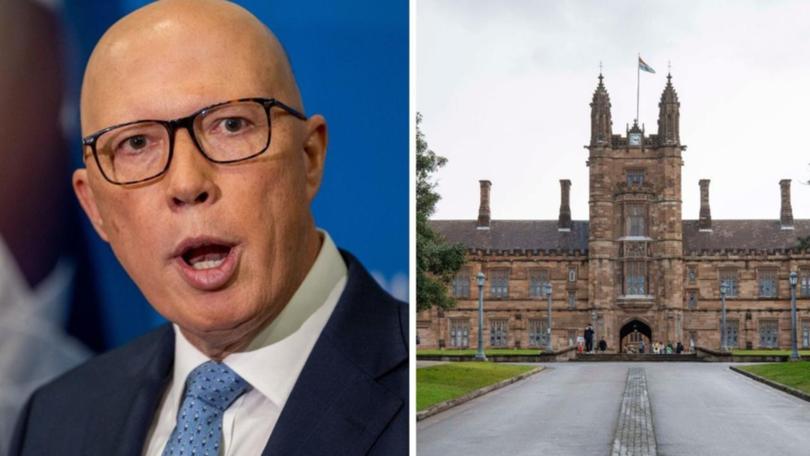Federal election 2025: Coalition to slash international student numbers by 80,000 to ease housing pressure
Peter Dutton says he’s prepared for a battle with the major universities over the Coalition’s policy to slash international students by about 80,000, saying it will help ease the housing crisis.

Peter Dutton says he’s prepared for a battle with the major universities over the Coalition’s policy to slash international students by about 80,000, saying it will help ease the housing crisis.
The Opposition Leader said he was “happy to have a fight on behalf of homeowners in this country”.
He said compared to Ivy League universities in the United States, Australia was an “outlier” in the ratio of domestic and international students.
Sign up to The Nightly's newsletters.
Get the first look at the digital newspaper, curated daily stories and breaking headlines delivered to your inbox.
By continuing you agree to our Terms and Privacy Policy.“Australia is an outlier, and there has just been a complete racket underway over the last few years where Australians have been locked out of housing and yes, the G8 (Group of Eight universities) have made a lot of money,” said Mr Dutton.
“So our problem is that it’s been distortionary to the housing market.
“When you bring in a million people over two years, 70 per cent more than any period in our country’s history, you know that the Prime Minister is creating a problem.”
Mr Dutton said the Coalition would slash international student arrivals by about 80,000 next academic year if it wins the May 3 election. .
He made the highly anticipated announcement aimed at cracking down on migration and relieving housing pressures on domestic students in the Melbourne suburb of Donnybrook, in the marginal seat of McEwen, held by Labor’s Rob Mitchell, on Sunday morning.
Announcing the proposed student caps and the effect of international students on housing, Mr Dutton described Donnybrook as the “epicentre” of Australia’s housing crisis.
“It’s like many places around the country, where we’ve got housing demand, where people just can’t find accommodation, rental problems in capital cities,” he said.
While the cap will lower enrolments by about 25 per cent, the exact number will be determined in government which will allow the Coalition to access the most recent data and consultation with the sector.
Coalition housing spokesman Michael Sukkar said under Labor there had been 42 new international student arrivals per housing arrival, with domestic renters and buyers punished for the increased pressures.
“That’s unacceptable. It’s not a situation that we’re willing to accept, because, as I said, we are the party of home ownership, but increasingly, we’re here to support renters as well, who are competing in the same market against this huge demand being brought on,” he said.
The changes are aimed at reducing the impact of foreign students primarily on metropolitan universities, where the Coalition says high numbers of international students have put the most pressure on housing and infrastructure.
After the Coalition kiboshed Labor’s attempted 270,000 international student cap, the Opposition Leader has vowed to cut enrolments by a further 30,000.
New enrolments at publicly-funded universities will not exceed 115,000, while VET, private university providers and non-university sectors will be capped at 125,000.
The cost of a student visa, currently $1600, will also be more than tripled in some cases.
The decisions will almost certainly be criticised by the higher education sector, with international education contributing about $51bn to the Australian economy in 2023-24.
The institutions in metropolitan areas include the University of Melbourne, the Australian National University, University of NSW, Sydney University, University of Western Australia,
Adelaide University, Queensland University and Monash University.
